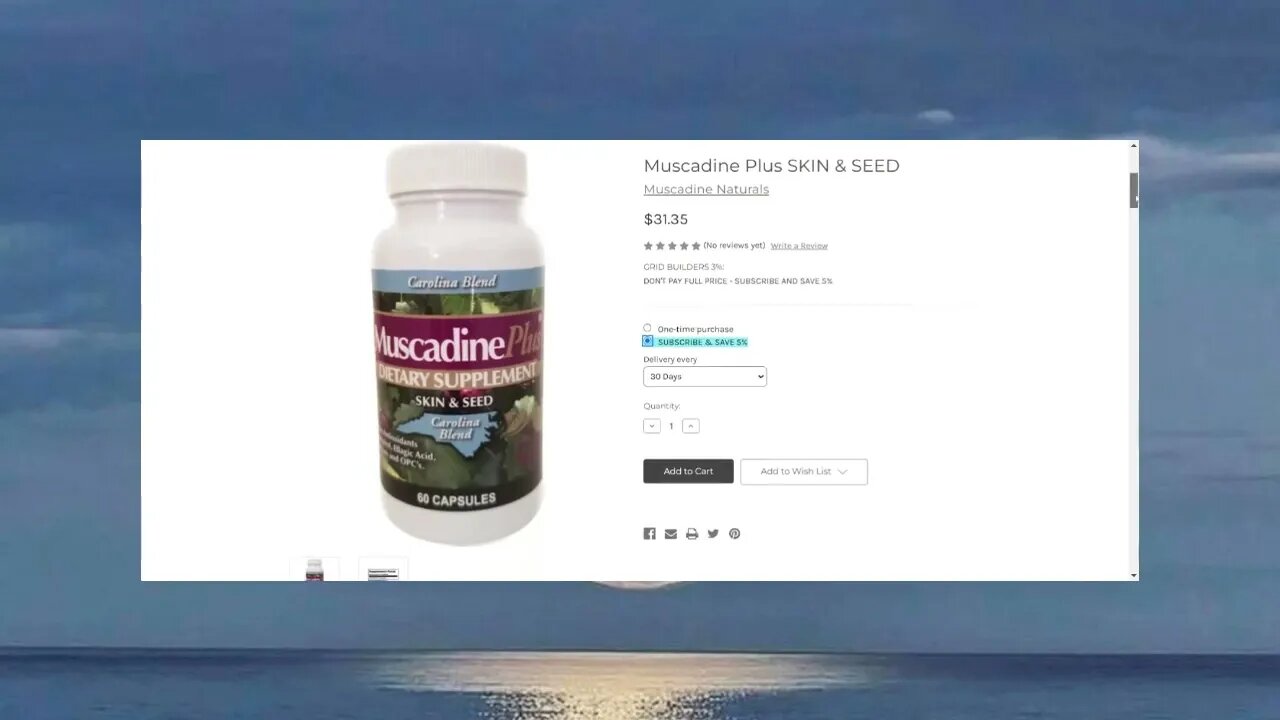Premium Only Content

Muscadine Grape Is Natural Way to Help Your Body with Powerful Antioxidants
https://brainhealthincome.com Carolina Blend is a proprietary & exclusive blend of Muscadine grape skin & seed without simple sugars. This product contains 100% of the polyphenolics of the entire Muscadine grape.
The Health Benefits of the Muscadine Grape
Antioxidants & Anti-inflammatory Agents
Many of the phytonutrients present in the Muscadine Grape have been recognized as powerful antioxidants & anti-inflammatory agents. Antioxidants are important because they rid the body of free radicals that damage our cells. Free radicals are caused by exposure to radiation, tobacco smoke, pollutants, solvents, & even intense exercise. Damage to DNA can also occur which can cause cell mutations resulting in cancer. There is strong evidence relating free radicals to aging & disease processes, e.g., cancer, atherosclerosis, immune system decline, brain dysfunction, cataracts, birth defects, rheumatoid arthritis, & inflammatory bowel diseases such as Crohn’s disease & ulcerative colitis. How Muscadine Grape phytonutrient antioxidants work is by binding & inactivating free radicals in the blood stream and in tissues.
Free radical production is controlled by several factors including antioxidants consumed as part of the diet. Some foods & supplements have higher antioxidant capacity than others. The Muscadine grape has over twice the antioxidant power as the blueberry based on Oxygen Radical Absorbance Capacity (ORAC) measurement.
Antioxidants can help prevent the initiation, propagation, & termination of free radicals. Muscadine grapes & the antioxidants present in this grape have been studied as powerful antioxidants. Some of the most notable phytonutrients studied as antioxidants & anti-inflammatory agents found in the Muscadine grape include but are not limited to:
Resveratrol
Piceatannol
Ellagic Acid
Catechin
Epicatechin
Quercetin
Myricetin
Pterostilbene
Gallic Acid
Pectin (a dietary fiber)
Kaempferol
Vitamin C
Caffeic Acid
Anthocyanidins
OPCs Oligometric Procyanidins
These phytonutrients are well-known in the scientific & health care professional community for their beneficial effects. Many have been studied as effective antioxidants & anti-inflammatory agents. While a high ORAC value is important, “many scientists think that the disease-fighting benefits of fruits & berries is not just due to their ability to provide antioxidant protection. It is also highly likely that phenolic compounds like resveratrol & quercetin produce specific gene responses reducing inflammation & improving the health of the heart & other organs.”
Nutrition
Muscadines are technically in the berry family & provide the beneficial phytonutrients associated with the purple to red range of fruits. Nutritionally, Muscadine grapes are low in fat & sodium, & have a healthy amount of potassium, fiber, and Vitamin C. The essential nutrients in a 100g (3.5oz.) serving of Muscadine grapes are listed in the table.
Interestingly it has been pointed out that the fiber in Muscadine grapes is more than that in oats. According to the FDA, a food that has at least 0.6 grams of soluble fiber per serving without fortification can make the following claim: “Low fat diets rich in fiber may reduce the risk of some types of cancer & may reduce the risk of heart disease.” One serving of Muscadine grapes clearly qualifies for this claim. This is one key reason Muscadine grape skin-based products are thought to lower cholesterol.
Nutrient Bronze-skinned Dark-skinned
Calories 68 76
Protein 0.5g 0.5g
Fat 0.4g 0.4g
Carbohydrates 12g 14g
Sodium 5mg 7mg
Calcium 17mg 24mg
Potassium 163mg 167mg
Magnesium 5mg 5mg
Vitamin C 7mg 6mg
Dietary Fiber 3g 3g
Soluble Fiber 1g 1g
The Muscadine Grape is very unique!
Muscadine grapes are scientifically known as Vitis rotundifolia & are genetically distinct from the French or bunch grape (Vitis vinifera). Muscadine grapes are native to SE United States & can be found growing wild in the yards of southern homes.
The Muscadine grape differs from other grapes in several ways.
First, the most notable difference is the thick skin of the grape. This thick skin gives the Muscadine grape a natural resistance to disease, fungi, & insects. The skin is where much of the antioxidant power of the Muscadine grape is stored.
Second, Muscadine grapes have an extra set of chromosomes containing genes that allow them to produce a unique balance of phytonutrients that are virtually absent in other grapes.
Third, the Muscadine grape has significantly more antioxidant power than other grapes. Based on the ORAC standard measurement, Muscadine grapes have been measured as high as 6,800 per 100 grams, compared to 739 for red French grapes. Muscadine grape skins alone have about 6-8 times as much antioxidant capacity as whole blueberries.
The fourth main difference in Muscadine grapes, other grapes is the amount of natural resveratrol and ellagic acid. These phytonutrients have been studied as powerful antioxidants with potent anti-cancer properties.
-
 6:53
6:53
Prife iTeraCare Devices For In Home Therapy
2 months agoiTeraCare 2025 Promotions | New Prife Customer Website | Inventory Available
45 -
 LIVE
LIVE
SpartakusLIVE
4 hours agoMonday MOTIVATION || Games w/ the BOYS into the NIGHT
412 watching -
 LIVE
LIVE
Barry Cunningham
3 hours agoNEWS ON THE PLOT AGAINST THE PRESIDENT AND IT'S A MOVIE NIGHT!
4,269 watching -
 2:00:32
2:00:32
Glenn Greenwald
5 hours agoWorld Finally Horrified by Israel's Atrocities in Gaza; Mass Starvation Expert Warns of Spiraling Crisis in Gaza; AOC Votes to Fund Israel's Iron Dome | SYSTEM UPDATE #489
43.9K69 -
 LIVE
LIVE
Spartan
3 hours agoSpartan - Pro Halo Player for OMiT | Scrims vs OMiT Black
13 watching -
 LIVE
LIVE
crgoodw1n
1 hour agoMonday stream Pt.2! Max Traders are almost here!
52 watching -
 LIVE
LIVE
Gurk
1 hour agoMLB CO OP
46 watching -
 1:46:27
1:46:27
Tim Pool
9 hours agoSin Frontera: The End of Illegal Immigration (DOCUMENTARY PREMIERE - 6pm EST)
174K56 -
 LIVE
LIVE
VapinGamers
2 hours agoDestiny 2 - Edge of Fate Legendary Run and AD Testing RTMP Pass Thru - !rumbot !music
123 watching -
 LIVE
LIVE
Joker Effect
1 hour agoULTRA MEGA STREAM! Let's review things... Also... Joker was right... again! What a surprise :) Also.. what the heck is @NetAxisGroup ?
482 watching